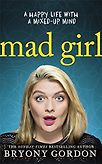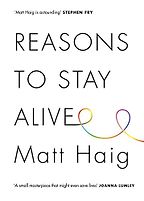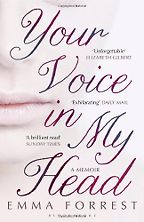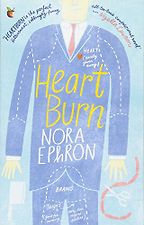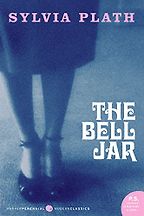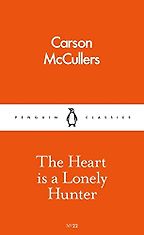Before we talk about books on depression, lets talk mental health—specifically, poor mental health—is an issue that is crucial to get people talking about more openly. Do you see talking about your own personal experiences as at the heart of that?
When I was 12 and I first experienced symptoms of what I now know to be obsessive compulsive disorder [OCD], I didn’t know it was obsessive compulsive disorder. I just thought I was dying of a terminal illness. And then the same when I was 17: I thought I might kill someone—I had intrusive thoughts—and I started having to say phrases to keep my family alive, I would hide my toothbrush under my pillow and I couldn’t touch my family because I was scared I was going to give them illnesses… and I had no idea what it was. I had no words.
And when you give words to a mental illness, it has less power over you. So from the moment I discovered that there was this condition called obsessive compulsive disorder, I knew that this was probably what it was, and that I wasn’t dying. I wasn’t terminally ill or a serial killer. What I’ve learned over the years is that I kept this all buried inside me and dealt with it by self medicating with drugs and alcohol and all the rest.
Then when I got to 34 and I had a child of my own, and a husband, I got really ill again, and I felt like, why am I keeping quiet about this? I’m a writer who writes endlessly about the things that go on in my life. I wrote a book about men snorting cocaine off my breasts and terrible sexual encounters and whatnot, called The Wrong Knickers and I realised that at no point had I ever felt able to talk about the background a bit, which was obsessive compulsive disorder. So when I got ill after my daughter was born, I was like: enough is enough. I am not going to give this condition the power it wants by staying silent about it.
So I started to write about it in the Telegraph and it was as if the floodgate opened. And I realised that by simply putting down the stuff that was going on in my head, it was helpful to other people. And it was also helpful to me, because once you get it down in black and white, it is literally out of your head. If that makes sense?
Absolutely.
I think that sharing stories of mental illness is really, really important because the thing that all mental illnesses have in common is that they lie to you. They tell you you are a freak. I always say that if mental illness was a politician, it will be Nigel Farage. It wouldn’t be nice to you. It tells you you’re a freak, and it tells you you are weird, and it tells you nobody else feels the same way that you do. And… that’s just bullshit.
Sorry, that’s not very scholarly use of language.
But it is true.
People do feel the same way as you. And what I learned when I started to write about my own mental illness was that it is through all the people who then started to write to me—hundreds of people saying: ‘me too’, if not with OCD, then other forms of mental illness—I realised that it was actually very normal to feel weird. To me, that is why it is so important to talk about your experience in mental illness no matter how shameful it may feel at the time because not only do you then show people what mental illness is, you also give it less power over yourself.
I wonder: what is the link between obsessive compulsive disorder and depression?
That’s a good question, and one that people often ask. They’re standalone conditions, but obviously there is a co-morbidity. I mean, I certainly feel that a long spell of OCD will leave me very depressed. But I don’t know. It is the chicken and the egg question; I don’t know which one leads to which, but for me they are very intertwined. One feeds the other.
Do you think that people should have more sympathy, particularly at work? That it should be taken more seriously in terms of giving people the time to recover?
Absolutely. Although, the funny thing is that sometimes you do need to get out of bed and go to work. Sometimes staying at home and lying in bed all day can be the least helpful thing.
But sometimes, if your body needs to rest. I don’t think we should beat ourselves for those lost days, as I call them: days where you can’t remember. Because it layers one thing over another. You feel bad during them, firstly, and then you feel bad for feeling bad. I think it is really important to be able to put your hand up and say: ‘I’m not feeling well today. I need this day at home. I need to be cared for by my family.’ Or, ‘I need you to say lovely things to me.’ That is really important.
Or to ask for practical help: therapy. I’m very lucky that I have access to a private healthcare scheme through my employer, so I can get free therapy through that.
It is really important that people put their hands up when they feel like they are drowning. I find that writing what’s going on in my head down, putting that down, can be really helpful as well.
Yes. I also have a similar experience of processing what is happening in my life through the medium of writing. I wonder if that too might be something that unites the authors of the books that help with depression that you have picked in this list: writing as a form of self-therapy?
Yes, I think that is. In my own example—not that I want to compare myself to Sylvia Plath, or Carson McCullers—for me, until writing Mad Girl, I hadn’t linked the alcohol abuse, the drug abuse, the bulimia. I didn’t link it together until I wrote it all down and then it was like I was able to come and join all the dots. It was an incredibly painful process: who knew that writing about mental illness will make you mentally ill?
So it was a really necessary process, and I feel now a lot further down the path of self-knowledge, or self-care, because of it. I’m not fully there.
I’m sorry to hear that.
No, no—what I mean is: life is a journey. It is a long journey. You don’t just come in and pick your role; you have to constantly work on yourself. It helped me to acknowledge, head-on, what was going on in my head. Doing that, you work through. But not if you ignore it by self medicating.
I wonder if perhaps we might turn to Matt Haig’s book, Reasons to Stay Alive? I know that many people say that they have found great solace in this book. Why do you recommend it as a book for depression?
When you are depressed, when you are experiencing mental illness, you find it very difficult to read. Any kind of enjoyable cultural activity becomes hard because your concentration tends to go. So if you are confronted by a doorstop [of a book] you just want to take a diazepam and go back to sleep. And if you can’t even bring yourself to pick up a book and read because you are so lost in your own head, then they’re not going to help you.
Get the weekly Five Books newsletter
The great thing about Reasons to Stay Alive—apart from the fact that it is brilliantly written, and apart from the fact that it is a really amazing portrayal of being suicidal, and apart from the fact that it is a book that really chimes with people—is that it is an easy book, in a depressive state of mind, to dip in and out of, and find that solace.
Matt’s book came out in 2015, and I was just starting to write about my own mental illness at the time, and I felt that the book gave me the courage to talk about my own stuff. I keep it on my bedside table. You know how they have the Bible in all hotel room drawers? Well they should have Matt Haig’s Reasons to Stay Alive.
Do you have a favourite part?
The thing for me that really resonated was the part where he is on the beach in Ibiza with his girlfriend. He just suddenly finds himself more… well, it really captures how these feelings can just come out of nowhere. What I really admire about Matt, and about all of these writers, is that I find with these very painful times, that—a bit like child birth—I will have whole months of my life that I just don’t remember because I was in a kind of fug of mental illness. So it’s very difficult to pick those moments out of it. And he’s done that so brilliantly and with such clarity. It is life affirming and important. Really important.
He was one of the first people—although, actually, Emma Forrest’s book came out before—who put everything out there, basically.
You mean Your Voice in My Head, your second choice? Can you tell us a bit about that book for depression?
I read this when I was in my late twenties. I’ve always really admired Emma Forrest as a writer and as a young journalist. She was one of those super-talented young girls who started writing for newspapers when she was about seventeen.
It is a kind of eulogy to her dead psychiatrist. He died when he was 53 [of lung cancer, without having told Forrest of his illness]. So, his voice is in her head. It describes the beauty of therapy and the importance of it. She tried to commit suicide and he kind of brought her back from that. I always say that finding a good therapist is like finding a good boyfriend or girlfriend. It’s such an important relationship. And to think of having that suddenly taken away from you… But, also, it wasn’t her relationship to mourn in a way. It was his family who needed to mourn.
It is, I suppose, a very unusual professional relationship. Because you are baring yourself to this person, emotionally. It is not a normal doctor-patient relationship. And it is one-sided.
Yes! They know everything about you, and then you find that you know very little about them.
But it is a memoir, a memoir of her experiences and her relationships. It’s unsparing. And she really, really, really captures, for me, that kind of madness in failing relationships. While also being very very stark and honest about it. For example, she had a relationship with [the actor] Colin Farrell. And she writes a lot about New York and Los Angeles, and it really comes alive.
But it is about heartbreak, obsession… the place that we women are ashamed to go to. When it comes to the end of relationships, it can get a bit obsessive and she is not afraid to go there and write it for what it is.
You highlight her honesty—and that’s something very striking about your own books. Baring yourself in that way must be a very difficult thing to do. Do you think that that’s important for other people going through the same thing, to have that almost brutal honesty?
I think it is. For me as a writer there’s no point of me writing books if I wasn’t brutally honest about it. But you can be brutally honest about it in a lighthearted way, that isn’t too hard to read. One in four of us will experience mental illness this year, so as I said, it is very normal to feel weird or to have experiences that feel completely awful. We all have them. It is a relief getting that out onto the page, and it can be a relief too for the reader.
It’s a different approach to that of Nora Ephron, in Heartburn. There she processes real-life events [Ephron’s then-husband, Carl Bernstein, had an extra-marital affair while she was pregnant] but she subverts it by making it a comedy.
I think it is very empowering. She goes through all this terrible stuff, then at the end [spoiler alert:] she shoves a cake in her husband’s face. It’s all about her coming up. It’s really important to have humour.
Heartburn isn’t strictly a book about depression. It’s a book about heartbreak and failing marriage and all that stuff. But what I really like about it is that it is really very funny—horrible things are happening to her, but it’s very funny—and it is really important to find humour in the bleakest of moments, wherever possible. Certainly, when I was writing Mad Girl, I didn’t want it to be a misery memoir. There’s a hundred billion misery memoirs out there, but what I wanted this to be was an upbeat book about depression, and it’s perfectly possible to do that.
Again, it’s about taking control over what’s in your head. Everyone loves Heartburn, don’t they? No one who’s read Heartburn hasn’t been like: ‘I love Nora Ephron, and what the hell was Carl Bernstein thinking?’ She takes something really negative and turns it into a massive positive, and I think that’s fucking awesome. And she makes everyone laugh along the way, and I think that’s what writing should really be about. These terrible things happen to all of us, so why don’t we all just get together and laugh collectively about them.
You can cry about them too! It’s like when you’re with a girlfriend who has just broken up with her boyfriend. She’s crying, but then you start joking about how awful he was, or that thing he did: and wasn’t he really a total douchebag? It’s a very human thing, trying to find humour in the depths of despair, and it is always there. It is always there.
There’s that special kind of laughter when you start off crying, but then somebody says something to make you laugh at the same time—
It’s almost a hysteria, isn’t it?
But also on a very practical level, it is a lovely cookbook. I just think it is the most charming, engaging, funny, lovely, edible book. It is an edible book in more ways than one. I think it gives hope. Hope is really important, when you are going through something like a heartbreak or a divorce.
I’m in no way as good a writer as Nora Ephron, but I’m definitely trying to capture that tone which is definitely something very inspiring.
Well, next on your books on depression list comes Sylvia Plath’s The Bell Jar. That goes to the other extreme, doesn’t it?
I know. You can’t have five books about depression and not mention The Bell Jar. I first read it when I was a teenager.
Me too.
As a teenage girl, you have to read The Bell Jar. It’s a rite of passage. I was about 16 or 17. I thought I was really cool, multilayered. It’s the seminal novel about depression, isn’t it? It is literally about that feeling: of being stuck underneath a bell jar.
The really fascinating thing about The Bell Jar is the way that mental illness used to be treated. Well, it still is treated with electroconvulsive therapy. That is quite shocking to read about. But there is also an undercurrent about the patriarchy — she doesn’t just want to be a housewife or a mum. She wants to be more expressive than that. There’s so many layers to it.
Behind it of course is the tragedy of what happened to Sylvia Plath. I called my book Mad Girl partly for her poem ‘Mad Girl’s Love Song’, which is also the inscription:
I shut my eyes and all the world drops dead;
I lift my lids and all is born again.
(I think I made you up inside my head.)
I do remember as teenager reading it, that description of what it feels like to be depressed, which is probably the first time I’d read something and thought, oh, hang on. Obviously I wasn’t in a mental institution, having electroconvulsive therapy, but it was around that time I started having any kind of awareness that perhaps something wasn’t quite right. And an awareness that perhaps this was something other people went through as well.
When I first read this book, as a teenager, I remember an English teacher telling me: ‘I don’t like Sylvia Plath, because of the effect it has on girls like you.’ I think what she meant by that was that it was somehow glamorising extreme depression. Do you worry about that, with Sylvia Plath’s writing, and story?
I don’t think it glamorises it. She ends up committing suicide. What your teacher said about ‘girls’: it’s a way of boxing us up again, isn’t it? What I think is that she [Plath] made it very clear to girls like us that you didn’t just have to be good girls who became wives, and that it was normal to have all of these feelings. You summed it up perfectly there: “girls like you.” Most women are girls like us. I think it gives voice to that.
I don’t think it glamorises it at all, do you?
I think that she was glamorous, but I don’t think that The Bell Jar is glamorous. I think The Bell Jar is very bleak.
Yes. I don’t think anyone who has gone through that—who has had the bell jar there on top of them—would think there is anything glamorous about that. As you say, it is incredibly bleak.
People always say that she was incredibly witty, a bon vivant, gregarious. That is what it is to be mentally ill. You aren’t just moping in the fucking corner, about to put your head in the oven. The portrayal of mental illness is very much of someone rocking back and forth, in a padded cell, but no — it’s me, it’s you, it’s everyone.
Shall we move on to Carson McCullers?
The Heart is a Lonely Hunter, the book, is another classic. She was 22 when she wrote it! Carson McCullers was a white woman, writing about black America, which is quite astonishing in many ways. She wrote about what it was to be an outcast, a misfit, to be depressed, to be lonely. She wrote about loneliness with such brilliance. But she had a sad life. She died of alcoholism in her fifties.
The thing that was special in Carson McCullers, for me, is that when I get ill, I run. I don’t run massive distances but I run. And I listen to documentaries and stuff. I was listening, earlier this year, to a documentary about Carson McCullers while running, and it was fascinating. But what was most fascinating and literally stopped me in my track was this archive audio recording of her. She said: “Sometimes it feels like everyone is part of a ‘we’ except for me.”
I was like, ‘You were wrong! You were part of a we, but you didn’t know it.’ But she created the we inside her books.
I felt that no one had ever said anything that quite chimed with me like that. The result of that was that I went home and thought: I’m going to find my we. And I went on Twitter, and said: “Who wants to join a mental health walking group? We’ll call it Mental Health Mates.” And eight months on we have several thousand members, and walks all over the country, and I have found my we. And that’s all thanks to what Carson McCullers said however many decades ago.
So that’s why she is very important to me. She’s sums up the need to find your we.
Have you felt that you’ve had a warm response to your own book?
Yes, it is really amazing. What I wanted was that by sharing my own experiences, people would feel able to share theirs. I don’t know how many emails or tweets or letters I’ve had saying ‘I appreciate exactly what you have written.’ That’s the sentence that I hear: ‘You could have written that about me.’ And I think: this is collective.
Five Books interviews are expensive to produce. If you're enjoying this interview, please support us by donating a small amount.
I think books are really important because they’re just quietly there. You can quietly identify with someone. There’s a trade-off between you and the person in the book, you’re having a relationship with that person without anyone else knowing, and you can find solace and comfort in that. I think that, to me, is the most incredible thing about writing the book. Forget about critics. The most incredible feedback you can get is ‘I felt as though you were talking to me’ or ‘talking about me,’ and that’s the thing any writer is aiming to do, isn’t it?
It’s having an affinity with someone. If people have an affinity with you through your book, that’s amazing. That’s so much what I felt like I had with Emma Forrest, with Matt Haig… all of these authors.
Do you ever find that readers of your books feel like they know you better than they do?
They do think that they know me. And they kind of do. I think that if you are going to write an honest book you’ve got to write an honest book.
So they do basically know me, and what I’m like. They may not know every single secret in my head, or everything in my head. But I think that if people think they know you, that’s a good thing.
It’s not something to be scared of. People are really scared of that. They say, ‘I want to keep this for myself.” Well, why? Why? I mean I could understand if you were Madonna or someone, and you wanted to keep a bit of privacy, but I find we are really in the cult of being mysterious and not over-sharing. It’s never ‘sharing’, it’s ‘over-sharing’. All sharing is seen as over-sharing. We have a very British stiff upper lip attitude: keep things to yourself, just get on with it. And I just think that’s bollocks.
I don’t mind that people think they know me, or that people don’t like me, at all. More people should feel able just to be themselves. There’s no joy in being misunderstood, is there?
Interview by Cal Flyn, Deputy Editor
October 6, 2016
Five Books aims to keep its book recommendations and interviews up to date. If you are the interviewee and would like to update your choice of books (or even just what you say about them) please email us at [email protected]

